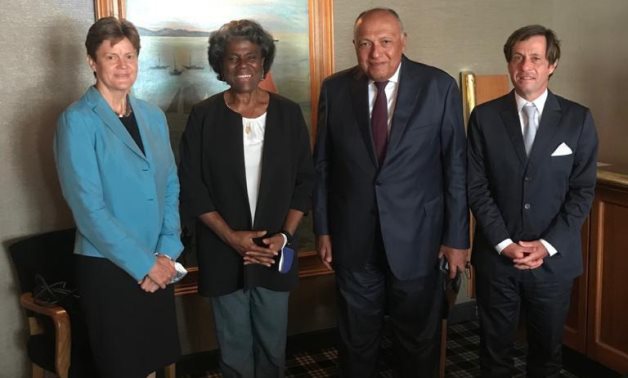
Minister of Foreign Affairs Sameh Shokry posing with UN ambassadors of United States, United Kingdom, and France on June 6, 2021 in New York. Press Photo
CAIRO – 7 June 2021: Ahead of the United Nations Security Council (UNSC) meeting on the Grand Ethiopian Renaissance Dam (GERD) crisis taking place on June 8, Minister of Foreign Affairs Sameh Shokry met with the UN ambassadors of the five permanent member states – U.S., UK, France, China, and Russia - and the AU Troika composed of the Democratic Republic of Congo, South Africa and Senegal.
Foreign Ministry's Spokesperson Ambassador Ahmed Abdel Hafez stated Tuesday that Shokry "presented the aspects of the Egyptian position on the Renaissance Dam issue showcasing Egypt's serious involvement in negotiations over a whole decade with the aim of reaching a legal binding agreement on the filling and operation of the dam that takes into consideration the interests of the three states, and stressing the extreme salience of the Renaissance Dam issue to Egypt in light of its relevance to the valuables of the Egyptian people."
"The minister also asserted the necessity that the Security Council fulfills its duties pertinent to the matter and backs efforts aimed at the resumption of negotiations targeting to reach a legal fair and balanced deal that achieves the interests of the three states," the statement reads.
The dispute among Egypt, Sudan, and Ethiopia dates back to May 2011 when Ethiopia started building the dam; Egypt voiced concern over its water share [55.5 billion cubic meters].
Three years later, a series of tripartite talks between the two countries along with Sudan began to reach an agreement, while Ethiopia continued the dam construction.
In 2015, the three countries signed the Declaration of Principles, per which the downstream countries should not be negatively affected by the construction of the dam.
In October 2019, Egypt blamed Addis Ababa for hindering a final agreement concerning a technical problem, calling for activating Article No. 10 of the Declaration of Principles, which stipulates that if the three countries could not find a solution to these disputes, they have to ask for mediation.
Washington had brokered tripartite negotiations among the three countries, in the presence of the President of the World Bank (WB) starting from November 6, 2019 until February 27 and 28, 2020.
During these rounds of talks, tangible outcomes were agreed on among the three parties concerning the rules and mechanism of operating the dam and the filling process of the reservoir during the drought and prolonged drought; however, an agreement was not sealed.
Constructions in the Grand Renaissance Dam started on April 2, 2011 at a cost of $4.8 billion. It was built by the Italian construction and engineering company Salini Impergilo. The Italian company is headquartered in Milan. The dam is located on the Blue Nile with a capacity of 74 billion cubic meters, and is expected to generate up to 6,000 megawatts of power.
The first filling was carried out in 2020 with 4.9 billion cubic meters. Currently, Ethiopia intends to do the second filling in July with at least 13.5 billion cubic meters.
On July 5, Ethiopia officially informed Egypt of starting to carry out the second filling, which is not expected to exceed four billion cubic meters, as indicated by experts.
Comments
Leave a Comment